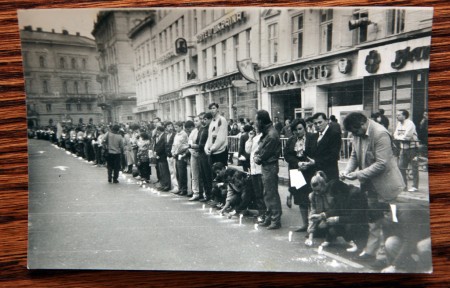
Traditionally, science is understood as having limited authority on ethical questions. While scientific knowledge is useful for understanding the world better – including in ways that change our moral thinking – the idea that you can have a scientific answer to a moral question is usually rejected. That position is itself rejected by Sam Harris in The Moral Landscape: How Science can Determine Human Values. Harris argues that we can use science to develop an objective sense of what is good for human beings and what is not, and that we can judge various practices using that scale. The book sharply and effectively criticizes both religious perspectives on the nature of the world and moral relativism. Indeed, the author’s principle project seems to be the development of a non-religious alternative to relativism, based around cognitive science. For the most part, his argument strikes me as a convincing one. That, in turn, has some important implications for political debates.
Harris’ book is a complex one that makes many different arguments and points. Often, he is able to illustrate his logic through clear examples, though some of them feel a bit cliched. He could also have devoted more attention to criticizing intuitive moral reasoning within western societies. He manages some elegant and convincing rebuttals, such as his response to the scapegoat problem on page 79 of the hardcover edition.
One key element of Harris’ argument is the view that it is the conscious life of animals that matters, when it comes to the basis of ethics: “[Q]uestions about values – about meaning, morality, and life’s larger purpose – are really questions about the well-being of conscious creatures”. He argues this point convincingly, and suggests that we can build from that claim and from factual understanding of cognitive science to robust ethical judgements. Harris pays relatively little attention to non-human animals, but that is clearly an area into which such thinking can be extended, when it comes to questions like factory farming or veganism. Harris says that: “The only thing wrong with injustice is that it is, on same level, actually or potentially bad for people”. A richer ethical theory might incorporate the interests of other conscious organisms in some way.
Some of Harris’ concerns do seem a bit exaggerated. For instance, when he walks about the danger of “the societies of Europe” being “refashion[ed]” into “a new Caliphate”. He also has a bit too much faith in the power of brain scans as they now exist. Being able to track which parts of the brain receive more blood flow than others is useful, but doesn’t necessarily allow us to develop nuanced pictures of complex ideas and thought processes. As such, his argument that since functional magnetic resonance imaging (fMRI) scans of people thinking about mathematical equations resemble those of people considering ethical propositions, we should consider that evidence that the two are similar things.
Ultimately, the argument made in The Moral Landscape is utilitarian. We can come to know the basics of what makes up a good human life, and we should arrange states and global society so that people can experience them (and so that they avoid experiencing the worst things, like slavery and total personal insecurity). He makes the important point that we cannot expect to know all the consequences of particular choices, but we can nonetheless reach firm conclusions about important problems. Societies that provide education for women are better than societies that keep them in ignorance. That claim can be justified, according to Harris, by carefully examining the mental lives of people living in both kinds of society.
In particular, Harris highlights how societies that are based upon secular ethics consistently do better in measurable ways than those which are most explicitly modeled on religious ethics. “Countries like Denmark, Sweden, Norway, and the Netherlands”, Harris explains, “which are consistently the most atheistic societies on earth – consistently rate better tan religious nations on measures like like expectancy, infant mortality, crime, literacy, GDP, child welfare, economic equality, economic competitiveness, gender equality, health care, investments in education, rates of university enrollment, internet access, environmental protection, lack of corruption, political stability, and charity to poorer nations, etc”. He attributes the claim to P. Zuckerman’s 2008 book Society Without God.
Harris’ purpose is not a dispassionate one, focused on description. He says clearly that: “[c]hanging people’s ethical commitments… is the most important task facing humanity in the twenty-first century”. I am not sure if I quite agree. You can argue that people need to change the fundamental basis of their ethical views in order to deal with a world of 6.7 billion people. Alternatively, you can see the problem as the disconnect between the choices people make and the ethical views they already possess. If people could directly see the consequences of their choices, I think their existing ethical systems would often drive them to behave otherwise. It is because the consequences are mostly hidden – largely imposed on people in other places, and in the future – that people often make choices that are so oblivious to the harm they are forcing upon other conscious creatures. Harris argues that “one of the great tasks of civilization is to create cultural mechanisms that protect us from the moment-to-moment failures of our ethical intuitions”. I think that is especially true when it comes to economics, public policy, and the environment.



